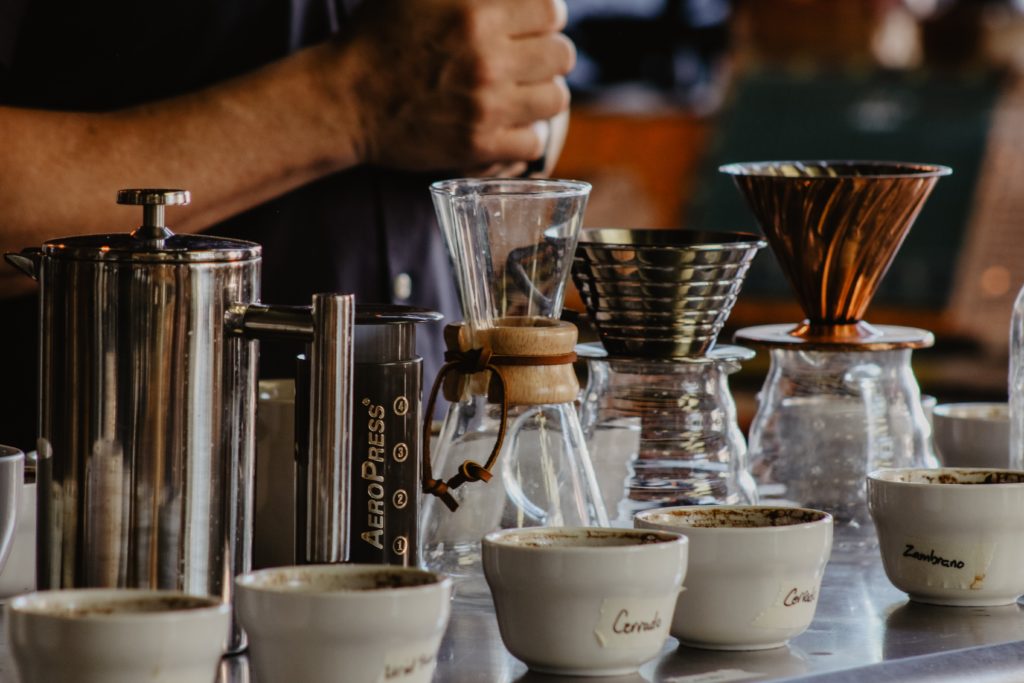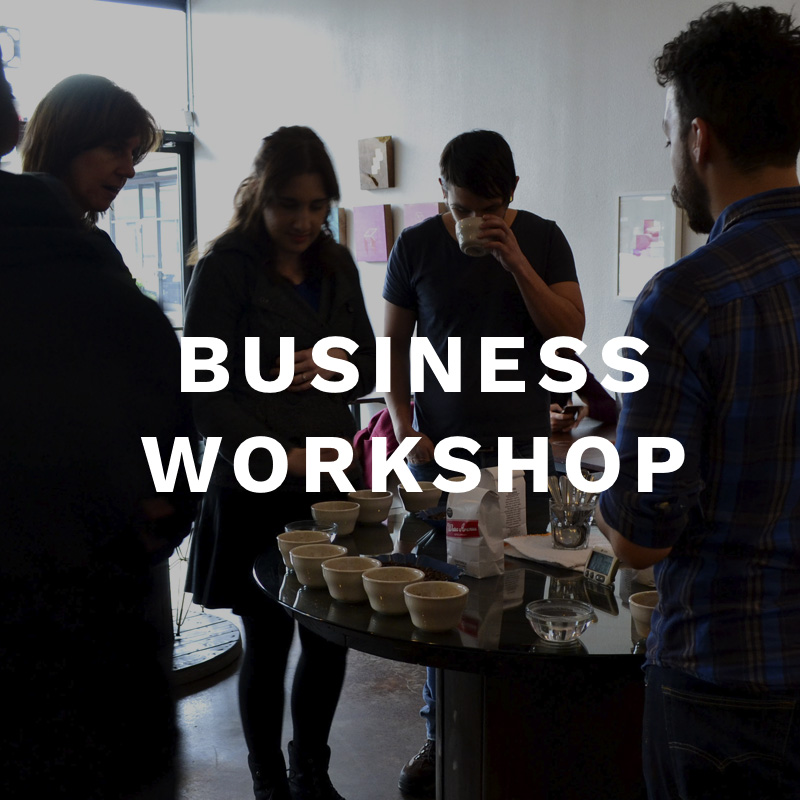When you start with better beans, you’re one step closer to serving the best coffee around.
What’s a specialty coffee business without genuine, quality coffee? Choosing your coffee is one of the most important choices you’ll make in your journey towards opening a coffee business. Knowing this, don’t rush the process! Taste as many coffees as you can and do as much research as possible to make sure you’re getting the best quality of coffee to serve to your customers. Don’t settle for mediocrity. If you were opening a steakhouse, would you choose the finest steaks to serve, or the cheapest? Choose the finest quality of coffee you can find and adjust your prices to match!
If you’re interested in coffee buying, also check out:
How to Find the Right Coffee Bean Wholesaler
Coffee will be your big seller, the star of the show. Don’t give your customers a lack-luster main act. If a higher quality coffee is a few more dollars more per pound, get it! In the end you can always make up for this price difference by increasing the price by a nickel or dime a cup. Higher quality coffee at slightly higher prices will bring in more customers than it will turn people away.
When choosing your coffee roaster there are a few things for you to ask before doing so:
- Does this roaster source only the highest quality of coffee beans?
- Do they have an extensive knowledge about roasting?
- Do they produce a consistently good roast?
- How often does this roaster roast the coffee you want?
- Does the roaster “open date” or indicate on the package when the coffee was roasted?
Choosing an Espresso Blend
We have come to realize that there are four essentials to choosing the quality espresso blend you’ll be serving in your coffee business:
1. Do your taste tests on a commercial espresso machine.
Any machines, other than commercial ones, won’t provide the amount of pressure and heat that’s needed to taste the different coffees at their best. Plus, you’ll likely be using a commercial machine to make espresso in your cafe, so you might as well use “real world” conditions.
2. You need to know how to properly prepare espresso to be able to choose the best blend.
Proper preparation is everything! An amazing coffee can be ruined if prepared incorrectly. You may think you’re tasting a bad blend when, in reality, the espresso just wasn’t made correctly. Make sure you trust whomever is pulling the shots.
3. Make sure the coffee has been roasted and blended for espresso.
We feel that some of the best espresso is produced from a blend of different beans, rather than a single-bean variety. This is where choice of roaster is very important! They need to know which beans to combine to give you the best espresso-specific blend. Ask lots of questions and don’t be afraid to ask for more explanation. A good roaster should be happy to explain their thought process and what they hope to achieve with a roast or blend.
4. Find a good variety of coffee to taste.
You want to make sure that you’ve explored all of your options before making this decision. To find this variety, talk to your local roasters, look to other coffee shop owners for recommendations, or call the coffee industry pros.
Some other things to consider when making this decision are your area and market. Depending on the area you’ll be located in, your customers will have different preferences. The age of your market will decide what drinks will do best and which will be in higher demand. For example, lighter roasts are often more popular with younger markets while darker roasts traditionally appeal to older markets. However, there are always exceptions. You might even want to consider using more than one brand or blend in your coffee business; as long as you can afford them, options are never a bad thing.
Taste Testing Your Espresso Blends
Taste testing coffee is quite an art form. Although some of it is up to your personal preferences as the taster, we think it’s important to remember some other things when conducting these tastings.
Who should be judging the coffee?
We think it’s crucial for you, as the owner, to be involved with these tastings as much possible so that you have a large role in the final decision. It’s not a bad idea to include others though too! They can help act as a variety of customer palates who will be coming into your shop. It’s also important to listen to your roaster’s advice on blends that have the qualities you desire. Especially as your narrow down your choice, consider asking people with a wide range of tastes what they think. This can help you figure out who your market will be, or help you choose the right coffee for your market.
How do I actually do these taste tests?
There’s a few things to remember when doing the actual test itself:
- Use a commercial espresso machine so that you’re able to extract your espresso shots as close together as possible.
- Use samples that have equal freshness.
- Don’t plan on tasting more than 5 coffees in one setting… you don’t want palate burn out.
- Do a blind taste test to avoid any biases you had about brands or blends.
- Take notes on all of the coffees you’re tasting, listing both the pros and cons of each.
- Taste the coffees three ways: straight shot, Americano, and latte/cappuccino. This is so you know how the coffee tastes alone and mixed with water or milk.
- Flaws in a coffee can be noticed if you taste it at three different temperatures: hot, warm, and room temperature.

Choosing Drip Coffee
While you’ll have your espresso lovers, you’ll also have your die-hard drip drinkers. Your drip coffee roast needs to be just as high of quality as your espresso blend so your customers get handed a quality beverage no matter what they decide to order that day. It’s also not uncommon to buy your espresso blend from one roaster and your drip from another. Some roasters specialize in one over the other, so do your research on where is best to get your roasts in your area.
The things to remember when tasting espresso blends are just about the same as what you’d need to do during drip coffee tasting:
- Use a commercial coffee brewer.
- Use coffee with equal freshness.
- Try up to five coffees at one time.
- Do a blind taste test.
- Bring in some friends with varied palates.
- Taste the coffees at different temperatures, taking notes along the way.
Additionally, try to judge how fast the flavor deteriorates in each coffee by tasting each at ten-minute increments. Use a thermal pot to hold your coffees as you wait to taste them. This simulates a real-life day in the cafe with your drip brew sitting in what it actually would be kept in. Your brewed coffee will be sitting out much longer than an espresso shot, so it’s important to know how it performs over time.
Choosing Whole Bulk Beans
It’s pretty common to walk into a coffee shop and have a nice variety of bulk whole beans to choose from. While it’s nice to give your customers variety, we recommend keeping your selection to around 4-8 varietals. The more choices customers have, the more overwhelmed they may feel when wanting to make the choice to buy a bag which could decrease sales. You don’t want a lot of wasted coffee beans! Also choose wisely when displaying these beans to make sure your shelves look full, while also not putting out too many bags that may go to waste.
Within your selection, try offering a selection that’s pretty well rounded. We found that these types of bulk beans sell the best:
- Espresso Blend
- Drip Blend
- French Roast
- Decaf
- Origin Coffees: Guatemalan, Costa Rican, Colombian, Kenyan, Ethiopian, Hawaiian, and Sumatran.
Select the favorite to be your “house blend” and then offer a different drip brew varietal each day or week. That way your customers will have a consistent blend and something different to try. Small variations in your menu also give customers a reason to come back in regularly.
Take Your Time
Don’t be hasty with your choice of coffee and roaster! These are the foundation of your coffee business’s success, so take your time to learn your product and roaster well. Developing a good relationship with your roaster is never a bad thing either. By taking time choosing your coffee, you will be able to make informed recommendations and serve better quality products. These are things customers look for when deciding to become regulars.
Our Business Workshop is jam-packed with information for the prospective coffee business owner. We can offer expert advice no matter if you’re opening your first shop or looking to expand. Learn about location scouting, marketing, management, and much more.


